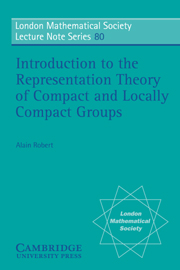Book contents
- Frontmatter
- Contents
- Foreword
- Conventional notations and terminology
- PART I REPRESENTATIONS OF COMPACT GROUPS
- PART II REPRESENTATIONS OF LOCALLY COMPACT GROUPS
- 11 Groups with few finite-dimensional representations
- 12 Invariant measures on locally compact groups and homogeneous spaces
- 13 Continuity properties of representations
- 14 Representations of G and of L1(G)
- 15 Schur's lemma: unbounded version
- 16 Discrete series of locally compact groups
- 17 The discrete series of S12(ℝ)
- 18 The principal series of S12(ℝ)
- 19 Decomposition along a commutative subgroup
- 20 Type I groups
- 21 Getting near an abstract Plancherel formula
- Epilogue
- References
- Index
21 - Getting near an abstract Plancherel formula
Published online by Cambridge University Press: 20 March 2010
- Frontmatter
- Contents
- Foreword
- Conventional notations and terminology
- PART I REPRESENTATIONS OF COMPACT GROUPS
- PART II REPRESENTATIONS OF LOCALLY COMPACT GROUPS
- 11 Groups with few finite-dimensional representations
- 12 Invariant measures on locally compact groups and homogeneous spaces
- 13 Continuity properties of representations
- 14 Representations of G and of L1(G)
- 15 Schur's lemma: unbounded version
- 16 Discrete series of locally compact groups
- 17 The discrete series of S12(ℝ)
- 18 The principal series of S12(ℝ)
- 19 Decomposition along a commutative subgroup
- 20 Type I groups
- 21 Getting near an abstract Plancherel formula
- Epilogue
- References
- Index
Summary
In this section, G will always denote a locally compact unimodular group. When necessary, we shall even assume that the topology of G has a countable basis for the open sets (in this case, G is metrizable and has a countable dense subset).
As in the preceding section, we motivate a definition by the consideration of a finite dimensional situation. Let π be a representation of some group G which is a finite sum of inequivalent irreducible representations. In a suitable basis of the representation space, the matrix form of it is given by diagonal blocks (of varied sizes) and Schur's lemma shows that if an operator commutes to π, it is given by a scalar multiplication in each irreducible subspace. In particular, the algebra of operators commuting with π(G) is a commutative algebra : it is a subalgebra of the algebra of diagonal operators in any basis compatible with the decomposition of π into irreducible components. Conversely, if π: G → G1(V) is a finite-dimensional representation with a commutative commuting algebra π(G)′ ⊂ End(V), it is often possible to diagonalize this algebra by choosing a suitable basis of the representation space. This will be the case if π(G)′ is stable under the operation of taking the adjoint (e.g. π unitary). In this way, we shall find a decomposition of K as a sum of inequivalent irreducible subrepresentations. In general, we give a definition.
Information
- Type
- Chapter
- Information
- Publisher: Cambridge University PressPrint publication year: 1983
